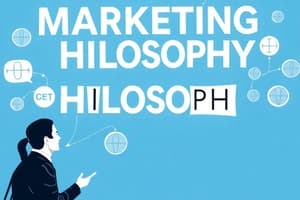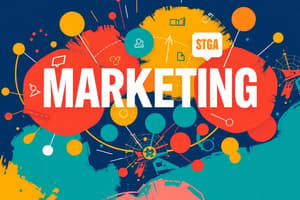Podcast
Questions and Answers
What is the primary purpose of marketing?
What is the primary purpose of marketing?
- To ensure the availability of resources
- To promote products through advertising
- To deliver customer satisfaction at a profit (correct)
- To create managerial jobs in companies
What are needs defined as in marketing?
What are needs defined as in marketing?
- A state of felt deprivation for basic items (correct)
- The amount of money available to spend on desires
- Cultural preferences influencing buying habits
- Specific items a consumer wishes to have
How are demands different from wants?
How are demands different from wants?
- Wants are a subset of demands in purchasing
- Demands are wants backed by buying power (correct)
- Demands represent complex cultural influences
- Demands are purely emotional responses
In the context of marketing, what does customer value represent?
In the context of marketing, what does customer value represent?
What role do exchanges play in marketing?
What role do exchanges play in marketing?
Which of the following best describes services in marketing?
Which of the following best describes services in marketing?
What is customer satisfaction primarily influenced by?
What is customer satisfaction primarily influenced by?
Which of the following statements about transactions is false?
Which of the following statements about transactions is false?
What is the primary goal of marketing management?
What is the primary goal of marketing management?
Which marketing philosophy focuses on consumers' needs and society's well-being?
Which marketing philosophy focuses on consumers' needs and society's well-being?
What does demand management aim to achieve?
What does demand management aim to achieve?
How does the Selling Concept primarily approach the market?
How does the Selling Concept primarily approach the market?
Which of the following is NOT regarded as a part of the Modern Marketing System?
Which of the following is NOT regarded as a part of the Modern Marketing System?
What characterizes the Marketing Concept compared to the Selling Concept?
What characterizes the Marketing Concept compared to the Selling Concept?
In the context of marketing management, which aspect is critical for building relationships?
In the context of marketing management, which aspect is critical for building relationships?
Which of the following concepts emphasizes affordable production and distribution?
Which of the following concepts emphasizes affordable production and distribution?
Which option describes an emerging challenge in modern marketing?
Which option describes an emerging challenge in modern marketing?
Which aspect of the marketing environment can influence company strategies?
Which aspect of the marketing environment can influence company strategies?
Flashcards
Marketing
Marketing
The process of individuals and groups obtaining what they need and want by exchanging products and value with others.
Needs
Needs
A state of felt deprivation for basic items such as food and clothing, or complex needs like belonging.
Wants
Wants
The form a need takes, shaped by culture and personality.
Demands
Demands
Signup and view all the flashcards
Product
Product
Signup and view all the flashcards
Services
Services
Signup and view all the flashcards
Customer Value
Customer Value
Signup and view all the flashcards
Customer Satisfaction
Customer Satisfaction
Signup and view all the flashcards
Modern Marketing System
Modern Marketing System
Signup and view all the flashcards
Marketing Management
Marketing Management
Signup and view all the flashcards
Demand Management
Demand Management
Signup and view all the flashcards
Production Concept
Production Concept
Signup and view all the flashcards
Product Concept
Product Concept
Signup and view all the flashcards
Selling Concept
Selling Concept
Signup and view all the flashcards
Marketing Concept
Marketing Concept
Signup and view all the flashcards
Societal Marketing Concept
Societal Marketing Concept
Signup and view all the flashcards
Integrated Marketing
Integrated Marketing
Signup and view all the flashcards
Profitable Customer Relationships
Profitable Customer Relationships
Signup and view all the flashcards
Study Notes
Chapter 1: Marketing in a Changing World
- Marketing is the process by which individuals and groups obtain what they need and want through creating and exchanging products and value with others.
- Marketing is more simply the delivery of customer satisfaction at a profit.
- Marketing involves companies providing solutions in the form of products, services, and experiences to solve customer problems—satisfying needs, wants, and demands—and customers paying back financially. Relationships are built in the process.
- Marketing is putting the right product in the right place, at the right price, at the right time.
Core Marketing Concepts
- Market: Includes individuals, needs, and wants and demands.
- Core Marketing Concept: The core ideas of value, satisfaction, quality, exchange transactions, and relationships.
- Product and Services are central to marketing concepts
What Motivates a Consumer to Take Action?
- Needs: State of felt deprivation for basic items like food, clothing, and complex needs like belonging.
- Wants: The form that a human need takes, shaped by culture and individual personality.
- Demands: Human wants backed by buying power.
What Will Satisfy Consumer Needs and Wants?
- Products: Anything offered to a market for attention, acquisition, use, or consumption that might satisfy a need or want. Examples include people, places, organizations, activities, and ideas.
- Services: Activities or benefits offered for sale that are intangible and don't result in ownership of anything. Examples include banking, airlines, haircuts, and hotels.
How Do Consumers Choose Among Products and Services?
- Customer Value: The benefit a customer gains from owning and using a product compared to the cost of obtaining it.
- Customer Satisfaction: Depends on the product's perceived performance in delivering value relative to a buyer's expectations; linked to Quality and Total Quality Management (TQM).
How Do Consumers Obtain Products and Services?
- Exchanges: The act of obtaining a desired object from someone by giving something in return.
- Transactions: The trade of values between parties, usually involving money and a response.
- Relationships: Building long-term relationships with consumers, distributors, dealers, and suppliers.
Who Purchases Products and Services?
- Market: Buyers who share a particular need or want that can be satisfied by a company's products or services.
- Actual Buyers: Consumers who have executed the purchase.
- Potential Buyers: Consumers who are interested in purchasing but haven't yet.
Modern Marketing System
- A model depicting the relationships between suppliers, competitors, the company (marketer), marketing intermediaries, and the end-user market.
Marketing Management
- Marketing Management: Implementing programs to create exchanges with target buyers to achieve organizational goals.
- Demand Management: Finding and increasing demand, and changing or reducing demand.
- Profitable Customer Relationships: Attracting new customers and retaining existing ones.
Marketing Management Philosophies
- Production Concept: Consumers favor products available and affordable.
- Product Concept: Consumers favor products offering quality, performance, and innovative features.
- Selling Concept: Consumers will only buy products if the company promotes them heavily.
- Marketing Concept: Focuses on needs and wants of target markets and delivering superior customer satisfaction., exceeding competitors.
- Societal Marketing Concept: Focuses on needs and wants of target markets to deliver superior value while considering society's well-being.
Selling vs. Marketing Concepts
- Selling Concept: Focuses on the selling of existing products to maximize profit.
- Marketing Concept: Focuses on the needs of a customer to offer value & satisfaction.
Societal Marketing Concept
- Emphasizes the needs of consumers and the well-being of society along with the company's profits.
New Marketing Challenges
- New Marketing Landscape & Information Technology: The changing digital environment.
- Ethical Concerns: Ethical implications of marketing practices.
- Nonprofit Marketing: Marketing for non-profit organizations.
- Globalization: Global marketing challenges & opportunities.
- Changing World Economy: Global economic shifts impacting marketing strategy.
Studying That Suits You
Use AI to generate personalized quizzes and flashcards to suit your learning preferences.
Related Documents
Description
Explore the foundational concepts of marketing as outlined in Chapter 1. This quiz delves into the processes of meeting customer needs, the importance of relationships, and the core marketing concepts such as value, satisfaction, and quality. Test your understanding of how marketing adapts to a changing world.




